#aot.meta
Text
Levi's Intelligence
Levi's intelligence is often overlooked, probably because he's compared directly to Erwin and Hange. Erwin and Hange are both extraordinarily intelligent, but Levi is immensely intelligent himself. He is able to read people (better than any other character), and he knows how to make the best use of what he has available. Many other users have done a wonderful job expanding on Levi's emotional intelligence, so I wanted to expand on some of his feats of general intelligence:
I. Ability to Both Think Long-Term and Make Quick Decisions While in the Midst of Battle
After Historia and Eren are captured by Kenny and the MPs, Levi avoids immediately chasing after them—similarly to how he approached the situation with the Female Titan. The overall strategic goal still remained keeping Historia and Eren safe, but Levi was able to recognize in the moment that chasing after them would not have successfully led to achieving that objective. Levi adapted his tactics, and the Scouts were overall more successful in their mission because of it.
Without Erwin, Levi is able to lead his remaining team to safety and take down an MP compound without casualties. They are all able to regroup and come up with a plan to rescue Eren and Historia because of Levi's quick thinking and long-term planning during this battle.
II. The Reeves Negotiation
Much has been said about Levi's kindness and compassion in this arc, about how he's interested in saving the city of Trost at no tangible benefit to himself (and after being directly mistreated by its citizens earlier in the same arc), but what I want to bring attention to is (1) that he was able to recognize the opportunity for a negotiation and (2) his skills at bargaining.
Directly after taking down the MP compound (Chapter 54: "Location of the Counterattack"), Levi and his team encounter Dimo Reeves, the boss for the Reeves Company as well as the merchant responsible for blocking the Trost gate earlier in the series. Levi is able to intuit that there is more to Dimo Reeves' "deal" with the MPs than meets the eye, so he brings Dimo Reeves outside to look over Trost together and converse. This demonstrates Levi's skill at reading people. No other character had indicated an interest in holding a conversation about Dimo's motives.
Dimo reveals how the Reeves Company has been at the mercy of the Interior MPs and how he has been following the MPs' orders to avoid getting immediately killed and losing everything—to protect his employees and their families. This conversation directly leads to a negotiation and then a deal being formed between the Scouts and the Reeves Company.
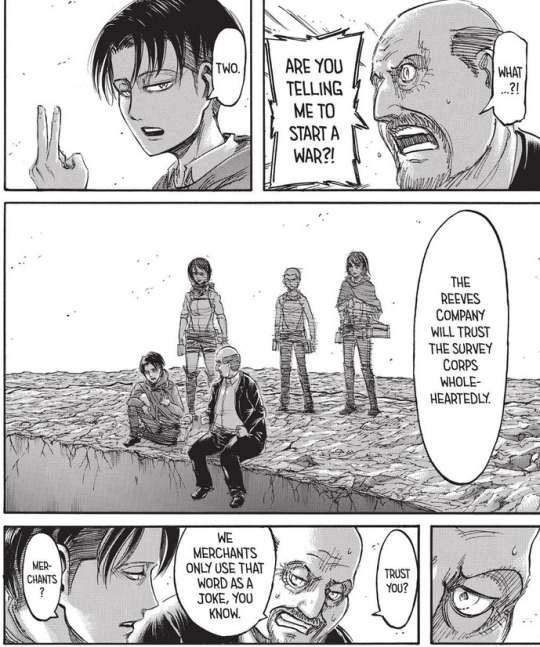
When Levi is laying out the conditions for the deal, it is evident that Dimo does not seem initially receptive. Levi uses the word "trust," which Dimo balks at.
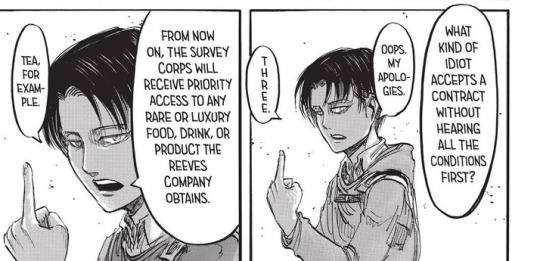
However, Levi's third condition, which is actually the most unimportant and superfluous one, results in Dimo accepting the deal. Why?
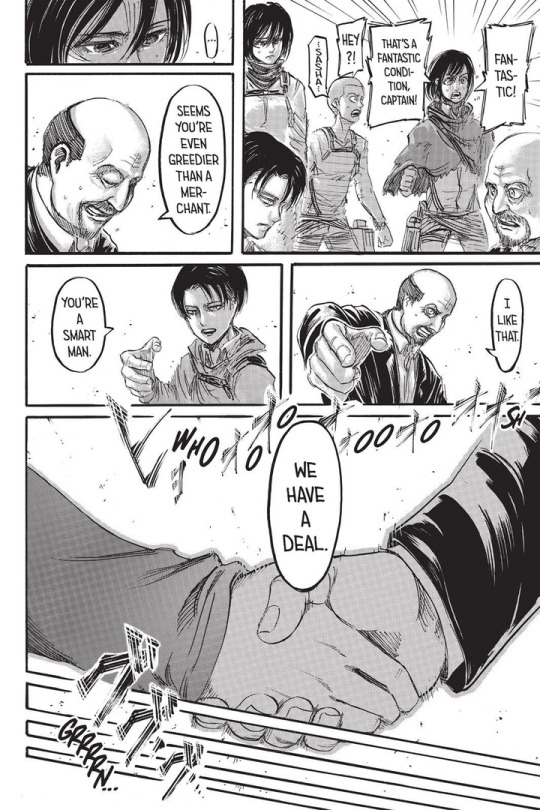
"Seems you're even greedier than a merchant." Dimo says this, as he is familiar at interacting with and respects other merchants. Levi added the third condition in, not simply because he wants tea and other luxurious goods, but because it brings himself down to Dimo's level. Without this condition, the deal may not have gone through. It is exactly this condition that results in Dimo "trusting" Levi as an equal.
This negotiation is also more evidence toward Levi's ability to think long-term. This deal between the Scouts and the Reeves Company benefits the Scouts for the remainder of the series.
III. Luring Kenny Into a Bar

Expanding on Levi's ability to make quick decisions while in the midst of battle, one of the best examples of this is Levi's first encounter with Kenny during the Uprising arc, where Levi lures Kenny into a bar and is able to defeat him as a result.
This goes beyond Ackerman prowess, as that is more related to superhuman strength and heightened combat reflexes. This is specifically a feat of intelligence; it's a sign of Levi's ingenuity—using aspects of the environment to his advantage. By luring Kenny into a bar, Levi is able to procure a weapon to even the playing field. Kenny himself is impressed and adds in that Levi was not taught these tactics by him. Some of the specific tactics of note:
III.a Use of Reflection
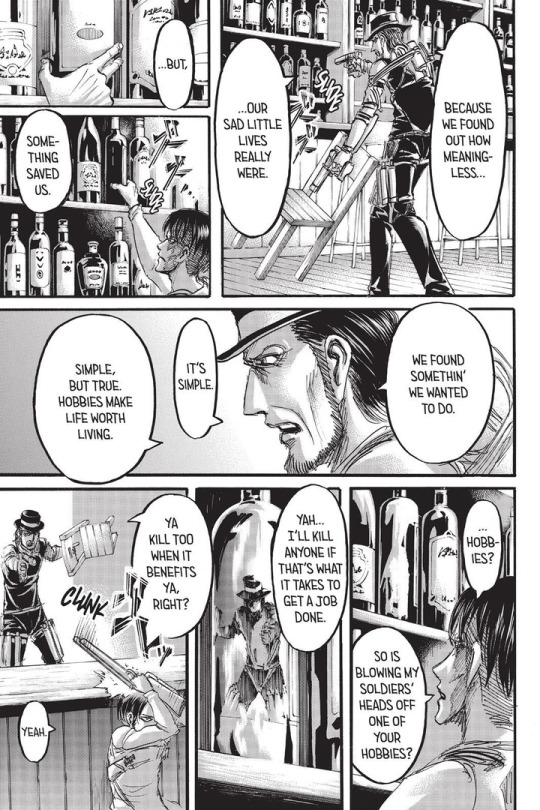
Levi is able to procure a shotgun while simultaneously taking cover from Kenny. He converses with Kenny to keep Kenny focused on him and not the bar's patrons, and even though Levi is facing away from Kenny, he uses the reflection off the alcohol's glass to properly aim the shotgun.
III.b Chair and Figuring Out the Firearms' Weakness
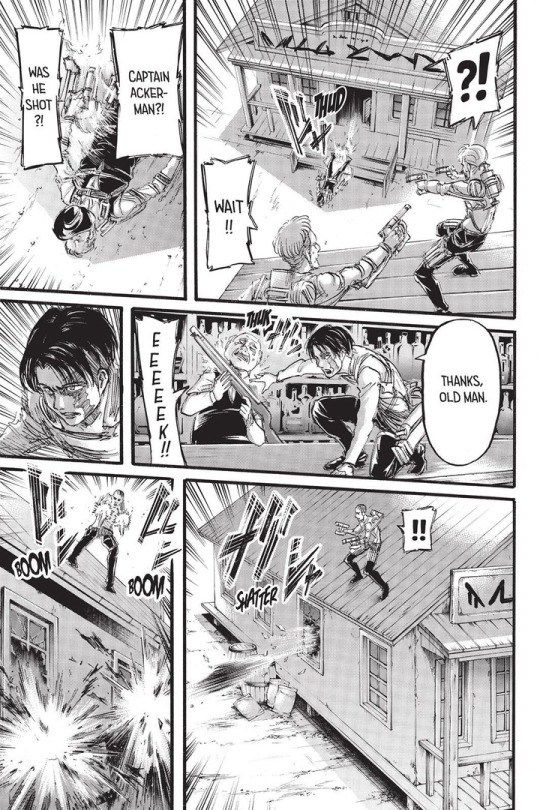
Levi knew he was going to be ambushed from up top as soon as he left the bar, so he threw a chair out the window to both distract and waste his opponents' shots. I'm fairly certain Levi was the first one to notice the main weakness of the anti-personnel vertical maneuvering equipment.
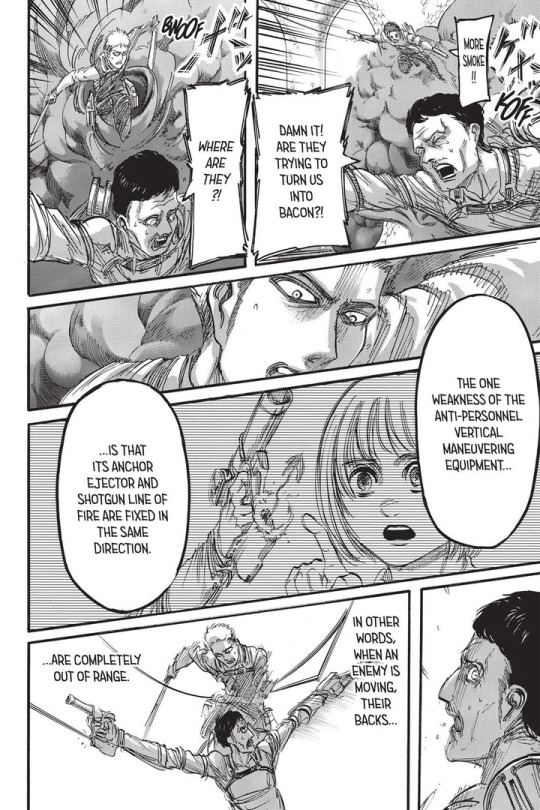
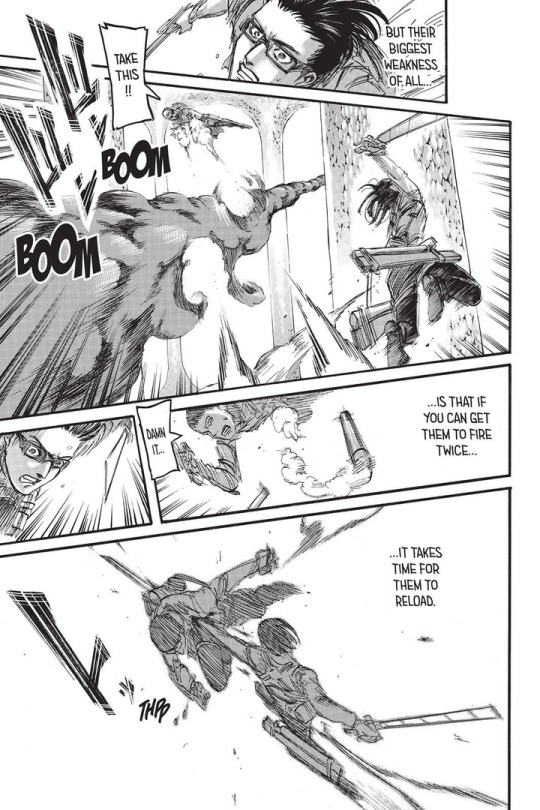
The main weakness, as Armin explains above in a later chapter, is that they need to reload after shooting twice. Levi first threw a chair, forcing one of his opponents to shoot twice, kills that opponent, and then uses that opponent's body as a shield against the other two guys' shots.
IV. Final Battle - Infers Immediately Armin is Alive
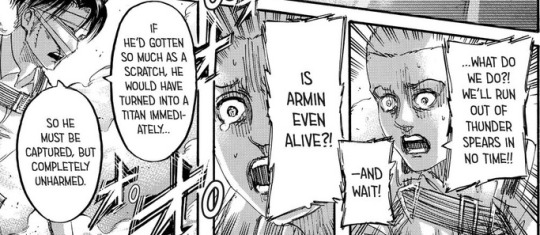
This one is pretty self-explanatory, but Levi is the first to infer that Armin has to be alive, given the way Titan powers work. As such, Levi is able to keep the others focused on the battle in front of them, knowing that Armin is alive and unharmed. This again speaks to Levi's quick thinking while in the midst of battle; it is often more difficult to make these sorts of judgments while in a fight-or-flight situation. Keep in mind as well that Levi is also grievously injured here, so it is even more impressive, how quickly he's able to make this inference.
V. Final Battle - Leadership and Planning
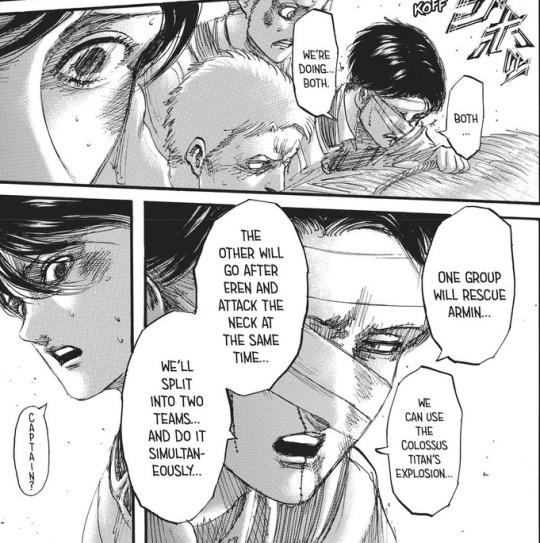
Full stop, the Alliance would not have succeeded without Levi, and part of that is because of Levi's ability to take charge and come up with a plan. This is the plan that they followed throughout the entire duration of the Battle of Heaven and Earth, and it is a plan Levi came up with, directly in response to an unexpected change in circumstances.
This again shows off Levi's skill in adjusting tactics to achieve a strategic objective. Even though the commanders are the ones often in charge of this, Levi is clearly very capable and adept at this himself. Right before this panel, everyone was arguing on how to proceed. Levi came up with the best overall plan, and in addition to that, formulated the two teams required to carry out that plan.
#attack on titan#shingeki no kyojin#levi ackerman#levi aot#aot#snk#attack on titan meta#aot meta#levi ackerman meta#c: levi ackerman#c: dimo reeves#aot.meta#meta.levi#my thoughts
261 notes
·
View notes
Text
Levi, Emotional Expression, and Social Interaction
I've seen different posts on Levi lately across different platforms that claim he is a cruel or mean person, which are fundamental misunderstandings of his character. I sort of see the problem as people mistaking Levi's emotional expressions (or lack thereof) as indicative of malicious intent or rude behavior. As such, I wanted to discuss how Levi's history and trauma have shaped how he expresses himself and relates to others. Once one has an understanding of that, it becomes evident that Levi's expressions should not be used to judge his intentions or feelings.
I wrote another post on how Levi fully meets the criteria for post-traumatic stress disorder (PTSD) on my main blog, and that diagnosis is important for understanding Levi as a character, as he's someone who's been largely affected by his trauma. To further expand on that post, we're going to discuss both Levi's affect and his ways of socially interacting with others, using concepts such as social modeling and self-monitoring.
What is Emotional Affect?
Affect, in psychology, refers to a patient's expression of emotion. Expression of emotion encompasses facial expressions, gestures, body language, tone of voice, etc. Mood, on the other hand, refers to the internal state of a patient's emotions sustained over a period of time. Affect helps us interpret a person's mood; however, there are such situations where affect can be considered inappropriate—that is, the person's affect is not entirely congruent (i.e., consistent) with the person's present mood and/or situation. A classic example of inappropriate affect would be laughing at a funeral, as that is incongruent with the context of the situation. Another example—a patient who is smiling and laughing after being involuntarily committed is considered to have an inappropriately euphoric affect.
Affect can be described across multiple dimensions, but the two most typically used are the quality of affect and the range of affect. Quality of affect is typically categorized as either euthymic (normal), dysthymic (depression, anxiety, guilt), or euphoric (an abnormally elevated sense of well-being, such as in mania). The range of affect can be labeled as labile, broad, restricted, blunted, or flat. Broad is considered the normal range of affect.
For the purposes of conciseness, we're going to focus on blunted and flat affects, as those are the range of affects that are best suited to describing Levi. Flat affect is when there is no variation in the patient's emotional expressions, regardless of their mood and situation. Blunted affect is similar, but it is a bit less severe—it means minimal variation. Practically, what do these mean?
Levi's Affect
When Kenny first finds Levi as a child, Levi is in a severe state of neglect; he is dying of starvation, he is wearing rags, his hair is unkempt, and he is sitting in the same room as his mother's decaying corpse. A typical child in this developmental range would be in extreme distress: crying, expressing fear, pleading for help, etc. However, Levi shows no such displays of emotions; he does not cry, he does not move, and he barely speaks. In fact, there is absolutely zero emotional expression, and there is no indicator he is upset about his situation (even as it is clear he must be). This is flat affect. Even in the short montage we see after Kenny has taken Levi under his "care", Levi never once shows variation in his emotional expression—no anger, no laugher, nothing.
Once Levi is an adult during the present timeline in the series, Levi exceedingly rarely displays his emotions. He often speaks in monotone, minimally varying the tone or volume of his voice—never yelling as well, even when angry. His smiles are so rare that it's a notable moment when he does smile (such as when Historia punched him at end of the "Royal Government" arc), and he never cries even after significant personal losses (except his one tear at the end of the series). His affect as an adult ranges from flat to blunted. This is significant too because we do know that his mood does vary, as it's clear from his verbal and body language the toll that different events take on him, and he does also display a sense of humor across the series. Again, though, his emotional expression does little to reflect how he's feeling.
What Causes Flat Affect?
To give a quick list of the most common causes:
Schizophrenia and other psychotic-spectrum disorders
Brain damage, such as from organic brain pathology or a traumatic brain injury
Neurodevelopmental disorders, such as autism spectrum disorder (ASD)
Severe psychological trauma, typically resulting in post-traumatic stress disorder
Major Depressive Disorder (MDD)
I will say outright that there is no evidence Levi suffers from schizophrenia, and thus, that is unlikely to be the cause of his flat/blunted affect, especially given the onset of Levi's flat affect and the exceeding rarity of childhood-onset schizophrenia. Similar reasoning applies to brain damage, so both of those can be excluded from the differential.
I do believe Levi meets the criteria for MDD in adulthood; however, that would be more so a comorbidity of his existing PTSD. Levi looked to be around 4-6 years of age at the start of Kenny's flashbacks, and MDD in that age group is quite uncommon, even when accounting for childhood-onset and adolescent-onset depression.
This leaves us with both severe psychological trauma and ASD as the two most likely causes of Levi's flat affect as a child and through adulthood. ASD can be a valid interpretation of Levi's significantly reduced affect display during childhood, as well as his consistent social difficulties throughout all of canon. Based on criteria laid out by the latest edition of the Diagnostic and Statistical Manual of Mental Disorders (DSM-5-TR), Levi can be seen as having ASD (which I'll likely make a future post on). However, the presence of severe psychological trauma confounds this diagnosis. Despite this confounding diagnosis, it is still possible he has both PTSD and ASD.
Regardless, the most likely explanation for Levi's range of affect remains severe psychological trauma. In a child that young, something had to have gone extremely wrong in his early upbringing for his significantly reduced affect display. An entire separate post can be written on this topic, but Levi demonstrates clear signs of an insecure attachment style by the time he's discovered by Kenny; this indicates that Kuchel, despite having loved Levi, was simply unable to properly care for him, and this resulted in deep and ingrained psychological trauma that affected Levi's ability to socially relate and interact with others for the rest of his life. I intend on going into more detail in a separate post, but Levi's attachment style is likely insecure-avoidant or insecure-disorganized.
Observational Learning and Social Modeling
Albert Bandura's social learning theory posits that children learn through a combination of traditional behaviorist processes (classical and operant conditioning), cognitive processes, in addition to observation and modeling. In reference to Levi, observational learning is the most salient aspect of this theory.
In simple terms, observational learning refers to the way children observe the people around them. Individuals observed are referred to as models. Models can include, but are not limited to, parents/caregivers, TV characters, school teachers, and friends within a peer group. Basically, children pay attention to these models and encode their behavior into their memory. At a later time, this behavior is then imitated. This is referred to as "social modeling".
Who were Levi's models? Kuchel, Kuchel's patrons at the brothel she worked at, Kenny, and others who lived in or frequented the Underground City.
Given Kuchel's circumstances and the danger of human trafficking in the Underground, it is likely she taught Levi to avoid interacting with anyone in order to ensure his safety. Kuchel's patrons, in all likelihood, abused her and Levi was most assuredly witness to this abuse or the effects of it in some way. Then, Kenny—Levi's most significant parental figure—was a prominent serial killer who displayed and actively taught Levi violence.
All of this points to Levi never having had the opportunity to learn proper social interaction. In fact, he was actively taught inappropriate and unhealthy ways to socially interact. Not only was Levi's emotional development stunted and severely impacted as shown through his lack of affect, but his ability to socially interact and relate to others was inhibited due to both his insecure attachment and the absence of appropriate social models. How does this manifest in Levi?
Self-Monitoring
Self-monitoring is the degree to which people monitor and adjust their self-presentations when interacting with others and across different social contexts. Whether someone is a high or low self monitor can be affected by their natural personality, their experiences growing up, and/or their neuropsychobiology.
High self monitors tend to be actively aware of the social image they are projecting, and they will be adept at responding to social cues. They will also vary the image they project dependent upon who they are interacting with and what the social circumstances are. They have greater concern over situational appropriateness, and they are often perceived as more friendly and pleasant by others.
In contrast, low self monitors tend to exhibit emotional expressiveness and social responses more congruent with their internal states regardless of social context. That is, they do not adjust their beliefs, attitudes, and dispositions to be more socially acceptable. As such, they are often perceived as rude, socially awkward, and/or unaware of others' social needs.
Levi is a low self monitor. Regardless of who he is interacting with or what the situation is, he consistently maintains the same attitudes and beliefs; he is always honest and says what he's feeling. He never adjusts his social tone, even when it would make him more appeasing to others. Throughout the series, he's often referred to as rude, socially awkward, a lunatic, etc. for his inability to self-monitor. This is a likely a result of the aforementioned psychological trauma, his lack of appropriate social models, his innate introverted nature, and his potential ASD.
Summary
My goal with this post was to explain how Levi's trauma and experiences growing up have formed the way he expresses himself and interacts with others. Levi never sets out to be seen as rude, unkind, or cruel. In fact, I'd say he is by far the kindest and most compassionate character in all of Attack on Titan. However, because of his social disposition, he is consistently misperceived by both characters in the series, as well as readers/viewers. Levi, through a combination of his innate nature and the environment in which he grew up, simply lacks the social skills and affinity for social interaction to properly explain himself and come across as more palatable to others.
Note: I am a doctor of psychology student, so much of this information has been informed by my schooling.
#attack on titan#shingeki no kyojin#levi ackerman#aot#snk#attack on titan meta#shingeki no kyojin meta#Levi Ackerman meta#aot.text#aot.meta#my thoughts#c: levi ackerman#meta.levi#text.levi
119 notes
·
View notes
Note
can you talk about kuchel and levi pls i loved your last post abt levi
Hi, thank you so much for your question! I'm really excited because this is the first time I've received an ask like this :) Thank you as well for your kind words on my post!
Off the top of my head, I'll lay out some of my thoughts in general about Levi and Kuchel and some of the speculations I have regarding the circumstances they were in together:
Kuchel seemed to be a victim of sex trafficking. She fled to the Underground City to escape persecution, but prior to that, we can assume that she lived a relatively sheltered and privileged life, as the Ackermans served and protected the King. Because of this, it is unlikely she would have had the skills or knowledge to defend herself once reaching the Underground, so I'm assuming she was preyed upon—especially since it doesn't seem like she ever awakened her own Ackerman powers. We also know that human trafficking is common underground, given Mikasa's backstory and some of the "Bad Boy" panels that have been released.
Given that Kuchel became pregnant with Levi by one of her patrons while working as a prostitute, Levi is essentially the product of rape; Kuchel's occupation was more akin to forced labor and sexual slavery than it was willful employment. I'm certain the circumstances of his birth were never lost on Levi, as I'm sure he witnessed his mother being forced to have sex on a highly frequent basis due to their living arrangements.
To elaborate, I'm fairly certain Kuchel and Levi lived in the brothel she worked at. When Kenny went to search for Kuchel's address, the man he spoke with referred to her as "Olympia" (her prostitute name). That man was also aware of her health status in reference to her ability to see clients, so I'm assuming he was the brothel owner. Building upon Levi witnessing the sexual violence toward his mother by her clients, the reason I think this is the case is because I doubt Kuchel would have felt secure in having Levi leave the room. Given the danger of their situation and how hostile of an environment the Underground is, Kuchel would have wanted to ensure Levi's safety from kidnappers by keeping him in her presence. From what we see of the room Levi was in when Kenny found him, there was only one relatively small bed and a paltry amount of furniture. Not many places for Levi to hide, unfortunately.
The likelihood that Kuchel had postpartum depression (PPD) is quite high, as certain psychosocial circumstances increase the risk factors for developing PPD: stressful life events during the pregnancy, unplanned pregnancy, food insecurity, violence against women, low socioeconomic status, low social support, single marital status, sexual abuse history, and more. All of these aforementioned factors apply to Kuchel. It is exceedingly unlikely Kuchel would have had access to treatment for any PPD she may have had as well. Furthermore, it is well-known that PPD can adversely impact the maternal-infant relationship, particularly untreated PPD. This would have affected not only Kuchel's ability to attend to her own needs, but also Levi's needs.
Levi was dying from starvation when Kenny found him. I imagine Levi was stuck with his mother's decaying corpse for around a week, and one does not reach that level of starvation from going without food for a week. Simply from those panels alone, it is evident Levi had probably gone without sufficient access to food for months at a time. This demonstrates that Kuchel was having significant difficulties providing for Levi's basic needs. Based on this fact alone, Kuchel would not have had the capabilities and resources to provide Levi with higher-level needs, like the feelings of love and belonging that children need to thrive. I think Kuchel clearly loved and wanted Levi deeply, just based on the panel of her crying tears of happiness while holding Levi as an infant; however, the reality of her situation would have precluded her from properly relaying this love to Levi.
Let's take a look at Maslow's hierarchy of needs:

Basically, human needs are arranged in this hierarchy, with lower-level needs required for survival having to be satisfied before moving on to higher-level needs. Higher-level needs cannot be met if lower-level needs are not. The more one progresses through this hierarchy, the harder it is to continue to move through the hierarchy due to the practical and interpersonal barriers that inevitably occur. Physiological needs are the most important because no other needs can be satisfied unless those are met. Practically none of Levi's physiological needs were being met during his childhood:
We've established he had no food.
Given the poverty they were in and the nature of the Underground, a lack of clean drinking water makes sense.
The barest minimum of shelter was provided, given the small room they lived in. The shelter itself was inadequate and unsafe.
Levi was dressed in rags when Kenny found him, so we can extrapolate that he did not have much clothing.
Due to the lack of sunlight and the known effects on circadian rhythm, as well as Levi's known issues with insomnia during adulthood, consistent sleep was also an issue.
Clean air quality also seems like it'd be an issue Underground, given the lack of electricity. Torches and oil lamps probably contributed significantly to air pollution, along with the proper lack of air ventilation.
On a different note, we know from Kenny's conversation with the man who I assume was the brothel owner that Kuchel got sick from one of her clients. Of course, it's possible that Kuchel may have gotten some other sort of illness from her client, but given the occupational hazards of her labor, I'm assuming this was a sexually transmitted disease (STD). We already know Levi is extremely wary and concerned about disease when he's older to the point of being seen as a "clean freak"; it seems pretty easy to trace this concern to his experiences living underground. Given how Kuchel became sick, it's not a leap to think Levi might associate sex with disease, especially if he ever learned about the concept of STDs. Levi probably internalized some very negative messages and associations regarding sex from his childhood with his mother.
Anyway, those are some of the basic thoughts I have in my head regarding Kuchel and Levi's circumstances. I do have some more, so I would definitely love to write more posts at some point on this topic. Thanks again for reaching out!
#attack on titan#shingeki no kyojin#Levi Ackerman#Kuchel Ackerman#aot#snk#attack on titan meta#shingeki no kyojin meta#c: levi ackerman#c: kuchel ackerman#r: kuchel & levi#aot.meta#meta.levi#meta.kuchel#ask#asks#my thoughts
61 notes
·
View notes
Text
Info
This is an Attack on Titan and Levi-centric sideblog. My main/personal blog for all other matters is @darkskywishes. I write meta about Attack on Titan and Levi, and I reblog other AoT and Levi-related posts. I'm a psychology doctoral student, so I often use that knowledge to inform my posts.
Name: You can call me Sky
Age: 27
Pronouns: She/Her/Hers
I like posts, follow, and reply from my main blog.
Regarding ask messages, I love receiving them and I’m happy to answer! It might take me some time to answer, though, as I am chronically ill/disabled and working on a doctorate. I promise I’m not ignoring anyone. All ask messages are tagged #asks.
All of my contributions are tagged #my thoughts. All meta posts are tagged #aot.meta. All shorter text-based posts are tagged #aot.text.
4 notes
·
View notes